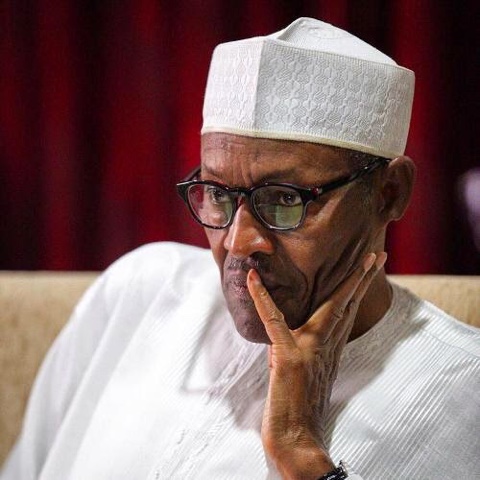Is President Buhari ready to go beyond personal moral example and commit proper class suicide and lead a ruthless fight against Nigerian corruption?
During his recent visit to the United States, the media reported that President Buhari said Nigerian business men should not be allowed into his meetings. On a more concrete note, the media reported that President Muhammadu Buhari openly objected to Nigeria’s Central Bank Governor Godwin Emefiele’s allowing of Jim Ovia, the former Managing Director of Zenith Bank, into the dinner party organised for the President by the U.S. Chamber of Commerce and The Corporate Council on Africa. The objection was reported as extending to include other businessmen such as Wale Tinubu. These are members of the Nigerian business class, and by extension the ruling class.
Being a member of the same class he is objecting to, purportedly in the fight against corruption, the relevant question is: Is President Buhari committing class suicide by attacking the same class or selected members of the same class that he – Buhari – belongs to?
President Buhari has a moral point in his objection. But the manner of his point shows the limit of individualised morality (a personal moral example) in the fight against corruption and the wreckage of the economy and polity by members of the same class he belongs to.
Privatising and moralising the fight against corruption – as President Buhari is doing – has serious limits, including those of a weak strategy and selectivity. Anger and frustration (rather than a thorough going class suicide that would reject corruption in all its forms and sources in a holistic manner) may not do the job. This makes Buhari open to charges of being inconsistent, especially since it is on record that he described General Sani Abacha – a major figure and symbol of corruption in the history of Nigerian corruption- as not being corrupt! On Sani Abacha’s legendary corruption, Buhari is wrong and he needs to admit that.
Therefore, President Buhari’s private moral example, often expressed in anger, will be insufficient down the road if he does not publicly articulate a mass-based, and mass-led campaign against corruption, while strengthening the legal and political institutions to do the job. That personal anger and moral example are insufficient to fight corruption is illustrated in how Abubakar Olubukola Saraki emerged, under legally and morally questionable circumstances, as Senate “President”, and how he is sitting pretty tight as leader of the entire Senate, despite Buhari’s moral example and rage against corruption!
The example of the need to have an ethically credible National Assembly leadership that will join Nigerians and Mr. President to defeat corruption is important because a leadership of the Legislature that is not a lackey of corrupt Nigerians, and that has zero tolerance for corruption would have been a strong complement to Mr. President’s anti corruption agenda and move the fight against corruption beyond personal moral example and outrage.
On the contrary, relying only on personal moral example – as President Buhari has been doing – rather than combining such example with expressly strengthening political and legal institutions sadly produced a National Assembly leadership and crisis (induced by personal ambitions and personal survival calculations by those elected) Nigerians cannot afford because the Change Mission against corruption is temporarily put on hold with respect to law making.
All these suggest that President Buhari being a member of the same class he appears to be angry with may not be ready to commit the requisite class suicide that will produce a thorough, holistic and ruthless fight against corruption. Important as Buhari’s personal moral example is, it is not synonymous with the requisite class suicide which a President who is a member of the class he is angry with needs to conduct a ruthless and efficient fight against corruption and defeat it.
However, Buhari’s point, which is a reading of Nigerian history both old and contemporary, is sound. It is that the moral, economic and political wreckage which Nigeria has suffered is a product of the marriage between the business class and the political class. Examples abound of this marriage of convenience that has lined the pockets of individual members of the business and political class rather than increase the fortunes of the country.
These range from the questionable import waiver policy under the ex-Coordinating Minister of the Economy, Dr. Ngozi Okonjo Iweala, whereby import waivers were granted to select Nigerian business men and women who were cronies of the then ruling PDP to the mind-boggling corruption in the Nigerian oil industry perpetrated by the marriage between the Nigerian business and political classes.
This marriage between the two classes in wrecking Nigeria include the alleged Societe Generale fraud by the present Senate “President” together with his politician father, Olusola Saraki; the Arthur Eze (Chief Executive of Triax) investments in Nigerian politicians thereby gannering suspicious military contracts; the N255m armoured cars corrupt deal between Stella Odua (the Aviation Minister under ex-President Jonathan) and Coscharis Motors Ltd; the $620,000 bribe transaction allegation between business man Femi Otedola (the Chairperson of Zenon Oil and Gas Ltd) and Mr. Farouk Lawan, a member of the House of Representatives. The investigation of the Otedola–Lawan bribery scandal died under the speakership of Aminu Tambuwal, who is now an APC Chieftain and governor of Sokoto – a strong member of the same class President Buhari is reportedly angry with!

